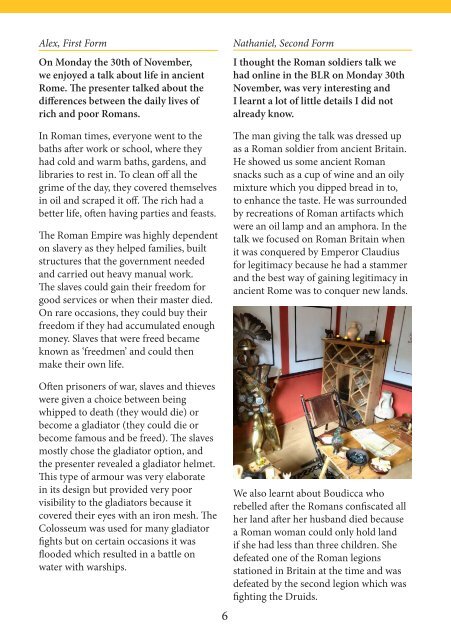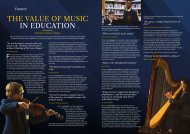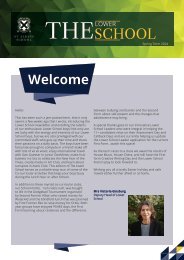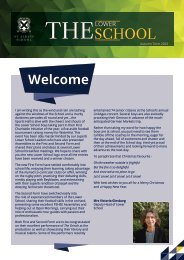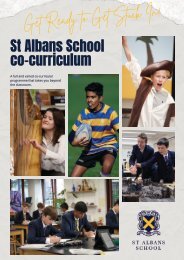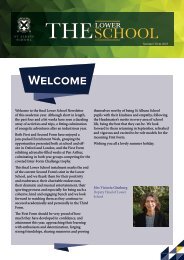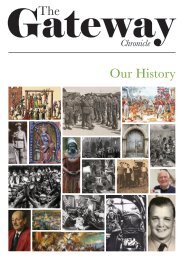Create successful ePaper yourself
Turn your PDF publications into a flip-book with our unique Google optimized e-Paper software.
Alex, First Form<br />
On Monday the 30th of November,<br />
we enjoyed a talk about life in ancient<br />
Rome. The presenter talked about the<br />
differences between the daily lives of<br />
rich and poor Romans.<br />
In Roman times, everyone went to the<br />
baths after work or school, where they<br />
had cold and warm baths, gardens, and<br />
libraries to rest in. To clean off all the<br />
grime of the day, they covered themselves<br />
in oil and scraped it off. The rich had a<br />
better life, often having parties and feasts.<br />
The Roman Empire was highly dependent<br />
on slavery as they helped families, built<br />
structures that the government needed<br />
and carried out heavy manual work.<br />
The slaves could gain their freedom for<br />
good services or when their master died.<br />
On rare occasions, they could buy their<br />
freedom if they had accumulated enough<br />
money. Slaves that were freed became<br />
known as ‘freedmen’ and could then<br />
make their own life.<br />
Often prisoners of war, slaves and thieves<br />
were given a choice between being<br />
whipped to death (they would die) or<br />
become a gladiator (they could die or<br />
become famous and be freed). The slaves<br />
mostly chose the gladiator option, and<br />
the presenter revealed a gladiator helmet.<br />
This type of armour was very elaborate<br />
in its design but provided very poor<br />
visibility to the gladiators because it<br />
covered their eyes with an iron mesh. The<br />
Colosseum was used for many gladiator<br />
fights but on certain occasions it was<br />
flooded which resulted in a battle on<br />
water with warships.<br />
Nathaniel, Second Form<br />
I thought the Roman soldiers talk we<br />
had online in the BLR on Monday 30th<br />
November, was very interesting and<br />
I learnt a lot of little details I did not<br />
already know.<br />
The man giving the talk was dressed up<br />
as a Roman soldier from ancient Britain.<br />
He showed us some ancient Roman<br />
snacks such as a cup of wine and an oily<br />
mixture which you dipped bread in to,<br />
to enhance the taste. He was surrounded<br />
by recreations of Roman artifacts which<br />
were an oil lamp and an amphora. In the<br />
talk we focused on Roman Britain when<br />
it was conquered by Emperor Claudius<br />
for legitimacy because he had a stammer<br />
and the best way of gaining legitimacy in<br />
ancient Rome was to conquer new lands.<br />
We also learnt about Boudicca who<br />
rebelled after the Romans confiscated all<br />
her land after her husband died because<br />
a Roman woman could only hold land<br />
if she had less than three children. She<br />
defeated one of the Roman legions<br />
stationed in Britain at the time and was<br />
defeated by the second legion which was<br />
fighting the Druids.<br />
We also learnt about Cartimandua, a very<br />
crafty queen who was loyal to the Roman<br />
empire, but had to leave her kingdom<br />
behind because there was a civil war and<br />
the Romans gave her a ultimatum to fight<br />
them, or retire and live a life of luxury in<br />
a villa in the bay of Naples.<br />
Tim, Second Form<br />
On Monday 30th November, Second<br />
Form Latin students were able to catch<br />
a glimpse of what it was like to be a<br />
Roman soldier. This was because of our<br />
online Roman session with Titus. He<br />
helped all of us understand how hard<br />
Roman life was as a soldier, and how<br />
small the British tribes were compared<br />
to the entire Roman army.<br />
6 7<br />
The Romans decided to come to Britain<br />
because they had heard the myths about<br />
all the riches that they would find here.<br />
My favourite fact was the fact that it<br />
took 3 years for the Romans to gather<br />
their troops and get to Britain. This was<br />
because they had to group legions from<br />
all over their empire, then replace them.<br />
Finally, they had to get across the British<br />
channel. In my opinion, this is the best<br />
way of learning. This is because it is<br />
interactive and encourages everyone to<br />
join in with the lesson.<br />
Throughout this session, despite a few<br />
technical difficulties near the beginning,<br />
the Second Form were taught all about<br />
how the British dealt with the Roman<br />
invasion. Many of them stayed put and<br />
did not put up a fight, however the Iceni<br />
– lead by Boudicca – were one of the<br />
very few tribes who were determined to<br />
force the Romans out. Boudicca offered<br />
the Romans a deal which accidentally<br />
allowed them to easily take over her land.<br />
We learned all this during the gripping<br />
session, and we are looking forward to<br />
next year’s Roman lesson.<br />
Ehsen, Third Form<br />
On the 30th of November 3rd Form<br />
Latin took part in an adventure through<br />
the world of the Roman Army and<br />
medicine. From the gory and detailed<br />
description of sophisticated Roman<br />
medical techniques to the fascinating<br />
world of Roman armour and weaponry,<br />
my classmates and I thoroughly<br />
enjoyed our virtual journey into the<br />
ancient battlefield. We learnt about the<br />
advantages and disadvantages of being<br />
a soldier, and we also dove into the<br />
reasons for someone joining the Roman<br />
army in the first place.


